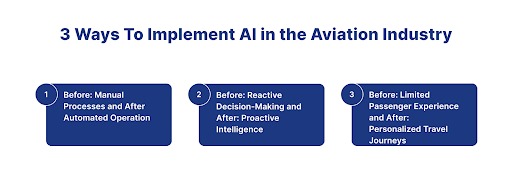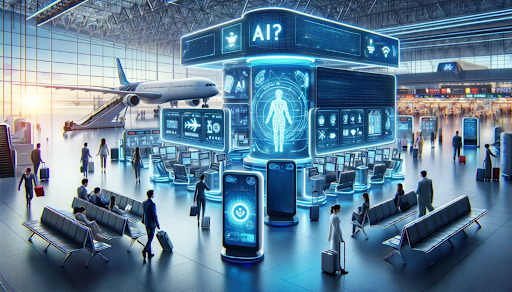AI In the Aviation Industry: Explore 3 Ways To Implement AI In The Aviation Industry To Revolutionize It
we will travel across time and technology to examine the revolutionary influence of AI in the aviation industry.
Introduction

- The aviation sector, recognized for its tireless pursuit of innovation, is at the vanguard of a technological revolution. Artificial intelligence (AI) has emerged as a driving force, moving the business into unexplored realms of efficiency, safety, and tailored experiences. In this blog, we will travel across time and technology to examine the revolutionary influence of AI in the aviation industry. Using the "Before and After Bridge" content strategy paradigm, we want to deconstruct the enormous transformations from manual procedures to automated operations, reactive decision-making to proactive intelligence, and a restricted passenger experience to individualized travel itineraries.
3 Ways To Implement AI in the Aviation Industry

1.Before: Manual Processes and After Automated Operation
A.Manual Processes
Flight Planning: Traditional flight planning requires substantial manual analysis, with flight crews and dispatchers depending on historical data and charts. The technique was time-consuming and needed more real-time flexibility in changing situations. Flight paths were preset, frequently resulting in inefficient courses, greater fuel consumption, and significant delays.
Maintenance Schedules: Aircraft maintenance was planned based on predefined intervals, regardless of component condition. This reactive strategy occasionally resulted in unanticipated malfunctions and increased downtime. Engineers and maintenance teams need more visibility into the real-time status of crucial systems, depending on periodic inspections rather than dynamic monitoring.
**Weather Forecasting:**Weather forecasting was a manual activity that relied on meteorologists evaluating data and generating forecasts. This technique was prone to errors since it depended on past patterns and could not quickly incorporate real-time information. Inaccurate weather projections frequently delayed aircraft schedules and raised safety concerns.
B.Automated Operations
AI in Flight Planning: AI algorithms are becoming crucial in optimizing flight paths. These algorithms consider various parameters, including real-time meteorological data, airspace congestion, and fuel economy. This dynamic technique enables adaptive planning, ensuring that planes use the most efficient routes, lowering fuel consumption, and minimizing delays.
Predictive Maintenance: With AI in the aviation industry, maintenance has shifted from reactive to proactive. AI in the aviation industry systems continually monitors the status of aircraft components in real time, identifying probable breakdowns before they occur. This predictive maintenance technique eliminates unexpected maintenance occurrences, boosts aircraft availability, and improves safety.
AI-Enhanced Weather Forecasting: AI-driven weather forecasting uses machine learning to examine large datasets and give more accurate and timely predictions. This enables airlines to make educated judgments about flight plans, decreasing the impact of severe weather conditions on schedules and boosting overall operating efficiency.
2.Before: Reactive Decision-Making and After: Proactive Intelligence
A.Reactive Decision-Making
Air Traffic Control: Traditional air traffic control functioned in a reactive mode, responding to unexpected changes and occurrences without the advantage of powerful predictive technologies. Controllers depended on manual communication and previous data, frequently making reacting quickly to dynamic air traffic circumstances challenging. This reactive strategy occasionally resulted in additional congestion and delays.
Emergency Responses: In aviation, emergency response was primarily reactive, conducted after an issue happened. The lack of real-time predictive skills makes foreseeing and minimizing possible emergencies difficult. This method created dangers and obstacles in crisis management, with responses occurring after the situation deteriorated.
Resource Allocation: The distribution of resources, including aircraft scheduling and staff deployment, was based on historical data and established timetables. This technique needed more flexibility for real-time fluctuations, resulting in inefficiencies in resource utilization and, on occasion, operational bottlenecks during peak times.
B.Proactive Intelligence
AI in Air Traffic Management: AI integration in air traffic management has provided controllers with predictive analytics. AI systems evaluate real-time data, forecast traffic trends, and optimize airspace utilization. This proactive strategy improves overall efficiency, lowers congestion, and allows for dynamic alterations to airspace layouts in response to changing conditions.
Predictive Analytics for Safety: AI-powered predictive analytics enables the detection of abnormalities and possible safety issues early. AI in the aviation industry can detect patterns suggestive of concerns before they escalate by continually monitoring multiple factors. This proactive safety method improves overall aviation safety by allowing preventive actions to be adopted in advance.
Dynamic Resource Allocation: AI in the aviation industry dynamically distributes resources depending on real-time criteria. This involves optimizing aircraft timetables, altering crew deployments, and reacting to shifting demand patterns. Consequently, resources are used more efficiently, operational bottlenecks are reduced, and the overall responsiveness of the aviation ecosystem is improved.
3. Before: Limited Passenger Experience and After: Personalized Travel Journeys
A.Limited Passenger Experience
Booking Processes: Traditional booking methods were conventional, with limited customization for individual guests. Ticket prices were frequently stagnant, with little regard for interpersonal preferences, travel history, or unique needs. The booking experience needed the custom customization flexibility that modern travelers have come to expect.
In-flight Services: In-flight services were generic and offered few personalization possibilities. Passengers needed more flexibility over their in-flight experience, with entertainment, dining selections, and other amenities following a one-size-fits-all paradigm. This lack of customization leads to a more homogenous and less pleasurable travel experience.
Baggage Handling: Baggage handling and tracking were prone to mistakes, resulting in inconveniences such as misplaced bags. Passengers sometimes needed help acquiring real-time information on the status and whereabouts of their items. This lack of openness contributed to uneasiness and discontent among passengers.
B.Personalized Travel Journeys

AI in Ticket Pricing: AI algorithms are increasingly crucial in customizing ticket prices. They provide dynamic and customizable pricing based on individual preferences, travel history, and market dynamics. This method guarantees travelers receive offers and pricing personalized to their unique needs, resulting in a more enjoyable booking experience.
In-flight Entertainment: AI-driven entertainment systems analyze passenger preferences and behavior to recommend personalized content. The content is curated based on tastes, from movies and TV shows to music and games. This enhances the in-flight experience, providing passengers with entertainment options that align with their interests.
Baggage Tracking with AI: AI-powered baggage tracking systems offer real-time, accurate information about the status and location of luggage. Passengers can easily access this information, reducing the anxiety associated with lost or delayed baggage. The transparency provided by AI in baggage handling in the aviation industry contributes to an improved overall travel experience.
Conclusion
- Combining AI with the industry's intricate operations has led to a transformational era in the dynamic and ever-changing aviation field. The impact of AI in the aviation industry goes beyond simple automation; it is a catalyst for change, altering how we perceive, navigate, and enjoy air travel. The journey begins with the automation of formerly manual operations, where AI in the aviation industry has effortlessly replaced onerous jobs with algorithms that optimize, forecast, and adapt in real-time. The change from reactive decision-making to proactive intelligence is a fundamental shift in how the sector predicts, responds to and mitigates difficulties. Previously based on historical data, safety is bolstered by AI-driven predictive analytics that anticipate probable abnormalities before they occur.
How Digiqt will help you adapt AI in your company
-
At Digiqt, we are dedicated to assisting companies in automating critical processes. Our highly skilled and professional team ensures the timely development and delivery of AI software. We commence by thoroughly understanding our client's specific requirements, and based on these requirements, our proficient team develops the AI software. Furthermore, we provide our clients monthly updates on the software development progress.
-
Digiqt's commitment to automation, client-centric software development, and regular updates ensures efficiency and effectiveness in streamlining insurance operations.















